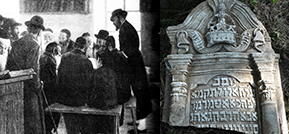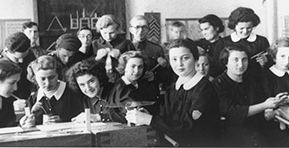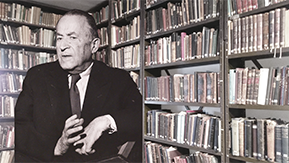In the 1870s, Jews constituted about a half of the town's population of 4,595 and were the largest ethno-religious group, counting 2,009 people. At the same time, Greek-Catholic Ukrainians numbered 1,788 and Roman Catholics, mostly Poles, 800 (Słownik 1:287). In 1870, there existed in Bohorodchany a pharmacy, a brewery, a distillery and three small tanning workshops (Słownik 1:287). The single class primary school was transformed into a two class school in 1868 (Istoriia Bohorodchaniv, 82).
In the beginning of the twentieth century, there were two state schools for boys and for girls in Bohorodchany, as well as Polish and Jewish kindergartens (Misto Bohorodytsi, 6). A school for Jews was established in Bohorodchany by the Baron Hirsch foundation in early 1897 (Ha-magid, no. 28, 23 July 1899, p. 238; no. 30, 26 July 1900, p. 349; no. 22, 6 June 1901, p. 247). In 1906-1907 the Baron Hirsch school had 206 students under the direction of three teachers of general studies and one teacher of Jewish studies (Pinkas Hakehilot, 72). A Hebrew school was opened in Bohorodchany in 1908 by "The Union of Hebrew Teachers of Austria." In 1911 it had fifty-five students and one teacher, I. Sparer (Gelber, Toldot, 2:725). In 1909 there was also a Jewish school for girls with Hebrew as its language of instruction (Pinkas Hakehilot, 72).
In 1910, there were 4,378 residents in Bohorodchany: 1,930 Jews, 1,647 Ukrainians, 795 Poles and 6 Germans (Misto Bohorodytsi, 6). There were eight restaurants, two hotels, four tailors' workshops, two tin workshops, five blacksmiths, six furriers, and ten shoemakers. The only pharmacy in the town belonged to a Jew Y. Gertner (Misto Bohorodytsi, 6, cf. 22-32).
In 1896, Rabbi Schreier established in Bohorodchany a local committee of the Tarnow based Association "Ahavat Zion" and became its chairman. His deputy was Tzvi Hirsh Rapoport. Members of the committee included Mendel Schumir, Gabriel Shwalb, Shmuel Meir Waldhorn and Josef Lautman (Gelber, Toldot, 1:337, n. 15).
Most probably, this committee was identical to the Palestino-centric society "Ezrat Israel," the establishment of which was announced in October 1896. It was set up as a branch of the "Zion" society in Lwow, with the purpose of taking part in the establishment of a Galician settlement in Palestine and included fifty members at its founding (Ha-magid, no. 40, 15 October 1896, p. 320). Its delegates took part in the Fourth conference of the Galician Lovers of Zion (Hovevei Zion) Congress in October 1896 in Lwow (Gelber, Toldot, 1:222; Ha-magid, no. 42, 29 October 1896, p. 333). The existence of the society was also mentioned in 1899, a member of its board was Tzvi Rapoport (Ha-magid, no. 23, 15 June 1899, p. 185). In 1898, Josef Lautman from Bohorodchany was elected to the regional Zionist Committee established by the conference of the Zionists of the Stanislawow region (Gelber, Toldot, 1:399). In 1899, the Zionist association of Bohorodchany was one of the seventy-five Zionist associations of Galicia (Gelber, Toldot, 2:432).
A branch of the religious Zionist movement Mizrahi also existed in Bohorodchany before World War I, one of thirteen Mizrahi branches in Galicia (Gelber, Toldot, 2:799).






